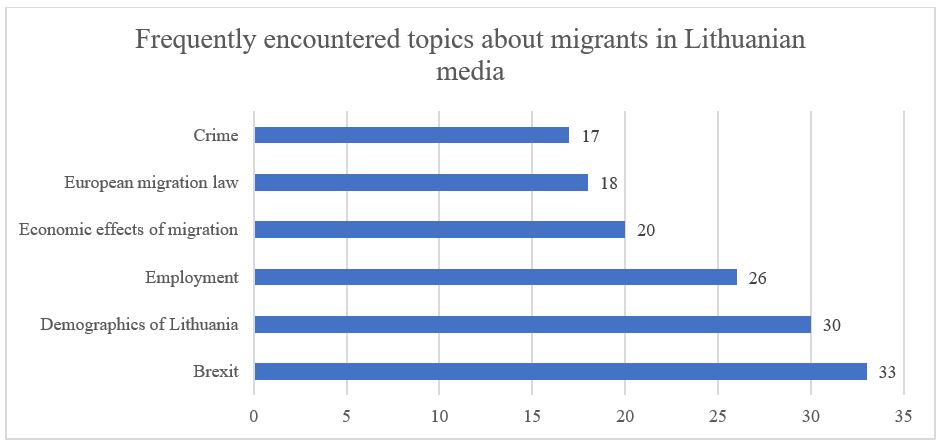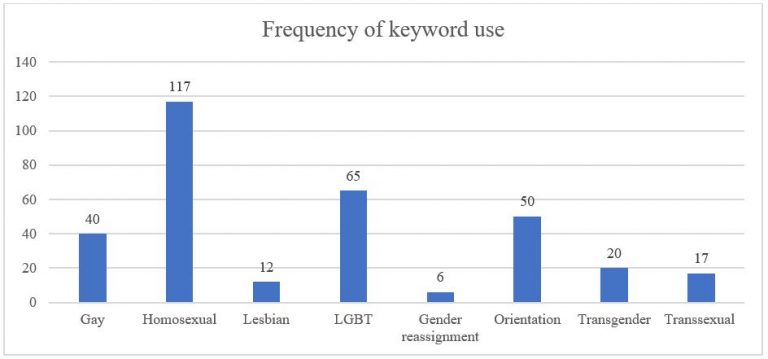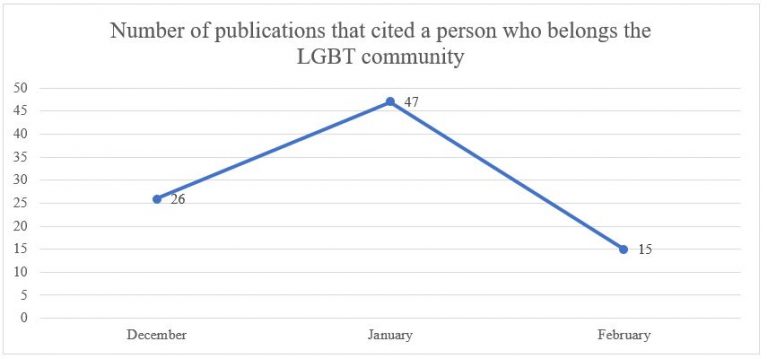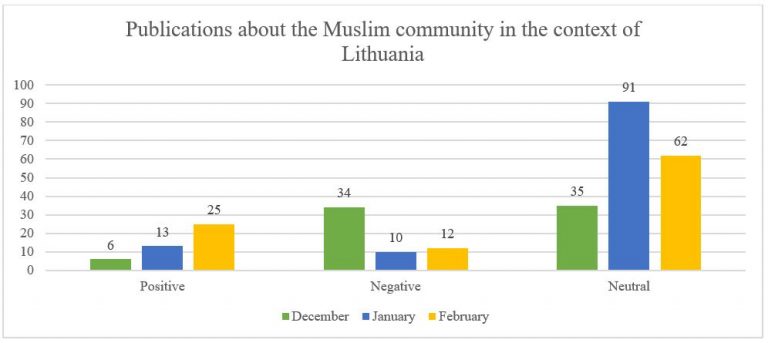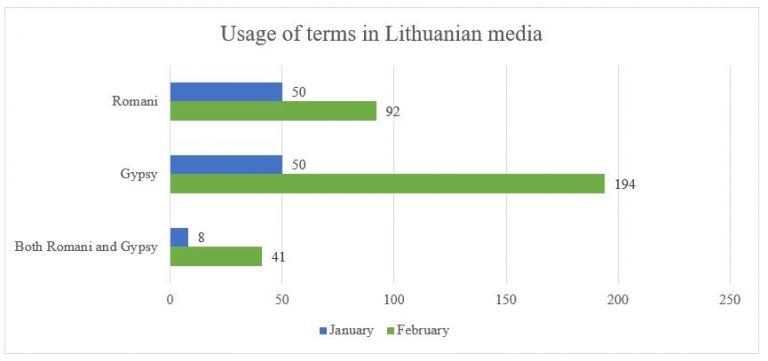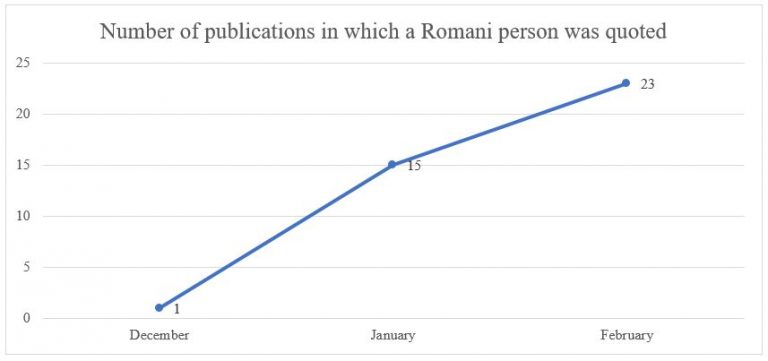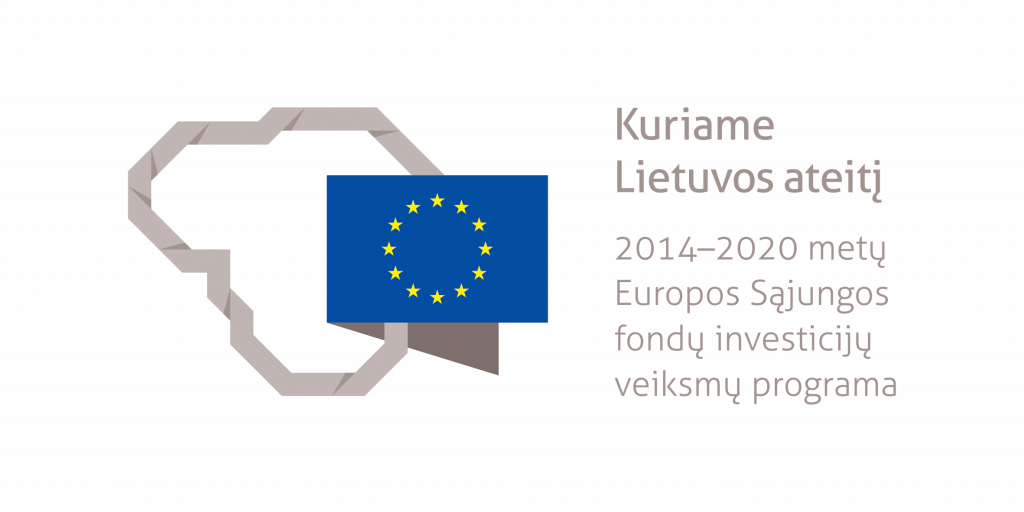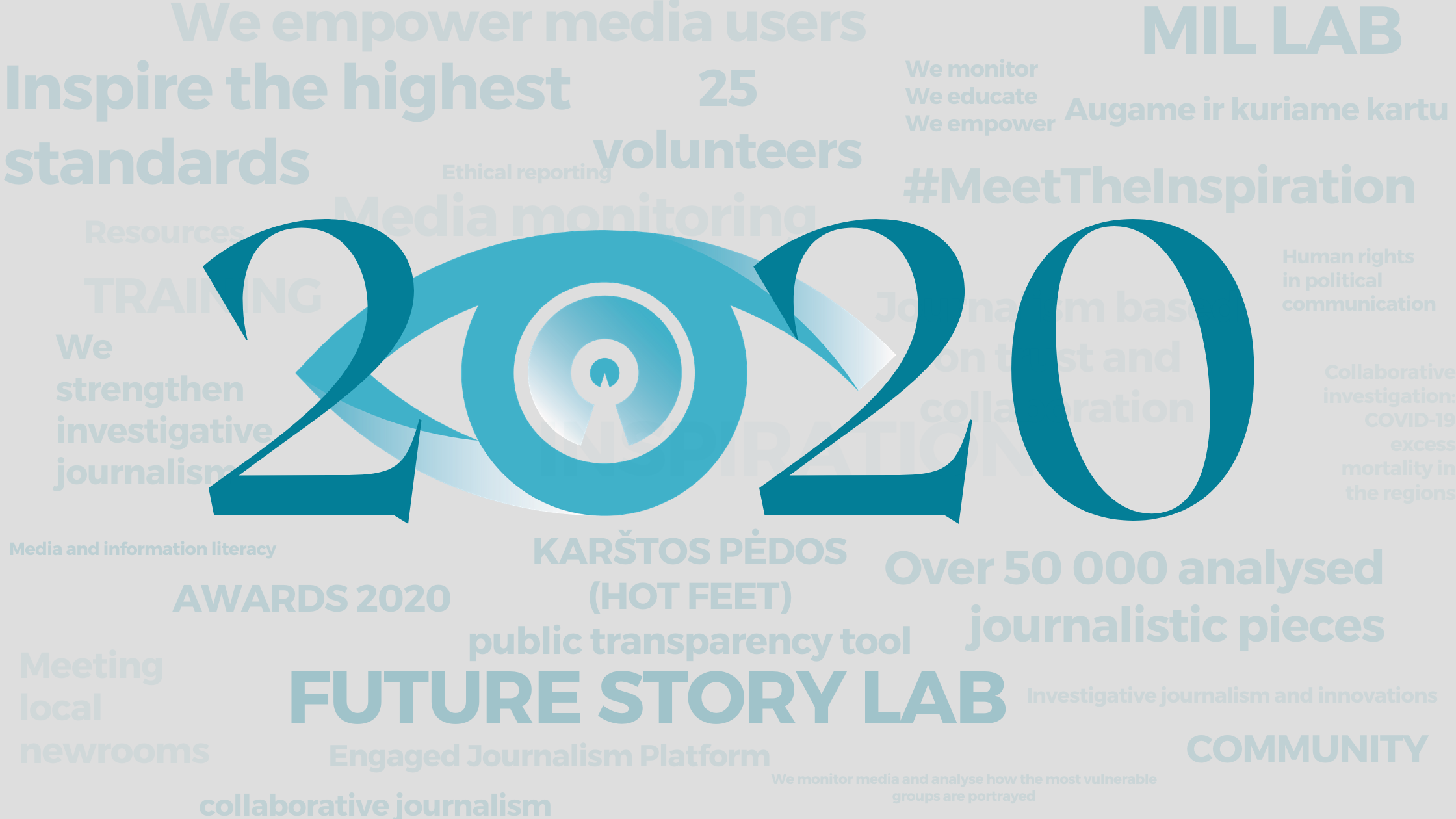The Media4change movement conducted media monitoring in February to monitor journalistic work on mental health, sexual orientation, migration, religion and national minorities. For the analysis, works were selected based on predefined keywords which discussed the above topics in the context of Lithuanian news.
The analysis carried out reveals how the media portrayed these groups, in what contexts they are shown, how public opinion is formed, how they are politically depicted, and what main perceptions of theirs are created.
National and regional media were monitored during the study period. The research analyses publications on the basis of quantitative (subject and genre distribution) and qualitative (source comparison and headline analysis) criteria.
MEDIA MONITORING: FEBRUARY 2020
The Media4change movement conducted media monitoring in February to monitor journalistic work on mental health, sexual orientation, migration, religion and national minorities. For the analysis, works were selected based on predefined keywords which discussed the above topics in the context of Lithuanian news. The analysis carried out reveals how the media portrayed these groups, in what contexts they are shown, how public opinion is formed, how they are politically depicted, and what main perceptions of theirs are created. National and regional media were monitored during the study period. The research analyses publications on the basis of quantitative (subject and genre distribution) and qualitative (source comparison and headline analysis) criteria.
MIGRATION
There were 278 publications on the topic of migration in the Lithuanian media in February. In 136 of them, migration was the main topic. Keyword „immigrants“ was used the most often – in 177 stories – while “migrant” was used in 107 and “refugee” 40 stories.
Migrants were cited in 19 publications. 11 out of these cases were Lithuanians who have migrated to foreign countries or migrants who have come back to Lithuania; this is related to numerous stories on Brexit and its impact on Lithuanian migrants residing in the United Kingdom. As for the rest of the publications, experts were quoted the most, especially economists (44 publications) and politicians (33 publications).
Migrants are discussed as part of such topics as Brexit (33 publications), demographics of Lithuania (30), employment (26), economic effects of migration (20), European migration law (18), crime (17).
Stories about crime were news reports about suspected document fraud – immigrants were named as one of the users of this service. Meanwhile, stories on Brexit were mostly analyzing the new conditions, under which Lithuanian migrants in the Great Britain would have to live, as well as forecasting possible population growth in Lithuania.

It is worth nothing that there were more positive articles than negative ones for the first time in 3 months. In the majority of these, economists are positively discussing the impact of migrant workers coming to Lithuania. There is also some noticeable growth in positive articles regarding migrants coming from regions affected by war.
Both national and regional press lacks positive publications about migrants: there was only one positive article, and 9 articles with negative tone found in February. Most of the positive publications on migrants can be found on the internet (27 out of 29).
Positive tendencies are also reflected in headlines:
“Migrant children were learning how to recognize emotions – when they remember their motherland, they smile the most often” (Etaplius.lt, Jonavoszinios.lt)
“I want refugees to feel welcome here” (Žmonės)
Nevertheless, negative headlines can still be found:
“Illegals are continuing to rush to Europe” (Vakaro žinios)
“Ghettos are going to be built in Lithuania? / Foreigners are replacing Lithuanians” (Vakaro žinios)
MENTAL HEALTH
There were 86 publications on the topic of mental health in Lithuanian media in February. In 26 of them mental health was the main subject.
People with mental health disorders were quoted in 2 pieces. In one of them the treatment of such disorders was discussed, and in the other one a person was sharing their personal story. Both articles were published on tv3.lt. It is worth noting that this is a decrease in comparison to the previous month – there were 6 articles that quoted people with mental health disorders in January.
The increase of positive publications is mostly related to the increase of extensive articles on mental health. Articles actively fighting stigma surrounding mental health disorders can also be found („Psichikos sveikatos centro vadovė: „Gaila, žodis „psichiatras“ vis dar kelia neigiamų emocijų“, tv3.lt). Such issues are also discussed in the regional press („Mokinių jausena ne mažiau svarbi nei pažymiai“, gargzdai.lt). This article is one out of 11 publications about kids‘ mental health in February. This increase can be related to 2020 being announced as the year of children‘s emotional well-being.
The word „psycho“, as used by famous entertainment personalities, was encountered more often than usual this month:
“<…> a person really has to look like a total bandit or a psycho in order to run to the Presidential Palace and try to get into the ceremony <…>” (quote from delfi.lt)
“He’s not a psycho. He’s a normal man. Got married, has a job, even wants and is able to have kids. When his and someone else’s personalities don’t match, that’s when the psycho comes into action.” (quote from tv3.lt)
SEXUAL ORIENTATION
241 publications about sexual orientation were found in Lithuanian media in February. 31 publications had sexual orientation as their main topic.
“Homosexual” was the most used keyword this month as well – it was used in 117 publications. The least discussed group is lesbians: they have only been mentioned 12 times this month, mostly when discussing the LGBT community in general.
15 publications cited a person belonging to the LGBT community (6 transsexual or transgender people, 9 gay people). Notably, after observing an increase in citations in January that were caused by the win in the ECHR, the number of publications quoting an LGBT person has dropped.
The subjects in which the LGBT community was discussed the most often were the Istanbul Convention (10), hate speech (15), personal stories (11). Other topics include Lithuanian politics and entertainment.
The increase of positive publications in January was mostly caused by the ECHR case. It has dropped once again this month, but the number is still better compared to the month of December. The majority of positive articles were interviews with various personalities who advocated for the LGBT community (for example, „81-erių DJ Wika: „Senatvė gali būti milžiniška motyvacija gyvenimui“, 15min.lt). Negative publications were mostly about the Istanbul Convention and the possible validation of gender as a social construct, as well as other issues pertaining to Lithuanian politics, namely characterizing the LGBT community as an entity that is destroying the country and its values (for example, „Paskutinis politinio lavono pirstelėjimas?“, Laisvas laikraštis, „Simonas Kroydonas nuo mafijinės teisėsaugos pabėgo į Londoną“, Laisvas laikraštis, „Tėvynė“ [4], Radviliškio kraštas).
It is also worth mentioning that the Lithuanian media used improper speech while reporting on the request of NBA player Dwyane Wade’s transgender child to call her “she/her”, meaning that the media continued to use male pronouns:
“D.Wade spoke up about his boy’s decision to become a transsexual” (sportas.lt)
“From now on his 12-year old son will be referred to as a daughter. This is what Zaya himself wanted.” (Lrytas.lt)
Publications about LGBT are still very uncommon in the regional press: none of the 31 pieces, in which the LGBT community was the main subject, made it into the regional press. The majority of these publications can be found on the internet (25).
MUSLIMS AND ISLAMISTS
453 publications relating to either Muslims or Islamists have been found in the month of February; 333 mentioning Muslim people and 135 mentioning Islamists. In 60 articles the main topic was either the Muslim community (52) or Islamists (8).
The term “Islamist” continues to be used exclusively for describing the actions of extremized military forces, with the exception of a publication that ended up both on the internet and in the press, in which the topic of world politics was discussed („Pasikliauti šiame pasaulyje galime tik savimi“, respublika.lt). The article refers to Muslims who have migrated to Europe in a very disrespectful way, and both “Muslim” and “Islamist” are used interchangeably.
The main topics this month were terrorist attacks (61), mostly about the actions of Islamists, as well as the terrorist attack against the migrant community in Germany, the relationship between the East and the West (60), discrimination against Muslims, especially regarding attacks in the Great Britain and protests in India (62). It is important to mention that these publications are usually neutral news reports; publications that have any connotations are usually either in the culture and lifestyle section or come up while discussing world politics in Lithuania.
In the context of Lithuania, there were 99 publications about the Muslim community. Notably, there has been an increase in positive publications in the last few months. As for the negative publications – they decreased and remained at about the same level. The increase in positive numbers is related to a publication about hate crime, which has spread among numerous news portals and newspapers (starting with Vakarų ekspresas „Neapykantos incidentai vis dar išlieka opia problema“), as well as words said by the head of the Lithuanian Muslim association Ahmed Faraz during the annual book fair, which were striving to break down stereotypes surrounding the Muslim community (for example, „P.S. Krivickas. Septynios džiugės iš Vilniaus knygų mugės (nuotraukos)“, Alkas.lt). Overall, Muslims or representatives of the community were cited in 14 publications.
Another publication that is worth mentioning breaks down stereotypes about the Muslim community and their culture that is often generalized as well („Kultūrų tyrinėtojas E. Račius: ieškokime panašumų, o ne skirtumų“, Alfa.lt).
ETHNIC MINORITIES
Poles
318 publications related to the Polish ethnic minority were found in February; in 86 of them Poles were the main subject of the publication.
Poles were usually mentioned in the context of Lithuanian politics (76) and Lithuanian history (89), especially regarding February the 16th and publications related to it. 15 publications cited a Polish person or a representative of the Polish community (the same as last month), mostly in the context of March the 11th, when the signatory Česlav Okinčic or the ones that abstained from voting on the aforementioned day were interviewed.
There were no significant changes in regards to the context in which the Polish community was mentioned. Negative connotations were usually discovered either in publications about crime which stressed the ethnicity of the suspect, or in historical contexts, especially discussing the Lithuanian Wars of Independence in 1918-20.
It is also worth mentioning that the newspaper “Šiaurės Atėnai” showed solidarity with the only Polish newspaper “Kurier Wilenski” in Lithuania which has not received any state support this year („Solidarizuojamės su „Kurier Wilenski“, Šiaurės Atėnai).
Russians
434 publications mentioning Russians were found in February. In 71 of them the Russian minority was the main subject.
Russians were mostly mentioned in the context of Lithuanian-Russian politics (74) and Lithuanian politics (53) (mostly in relation to national security), history (70) and propaganda (72). The increase of pieces about propaganda is not surprising – 53 out of 80 publications about propaganda were about the incident in one of Klaipeda’s schools where a teacher broadcasted her very one-sided opinion about the current Russian government during one of her lessons.
A Russian person was cited in 7 publications, predominantly in interviews that were mostly about business or lifestyle. This is a decrease in comparison to January when 20 such publications were spotted.
There is a noticeable increase in positive articles – this is mostly related to publications about cultural events during which Russian culture was praised. Meanwhile, negative publications were mostly about history or crime. The drunken Russian stereotype is still used in publications every month.
Jews and Judaism
663 publications mentioning the Jewish ethnic minority were found in February; in 263 of them the Jewish community was the main subject.
47 publications cited Jews or the representatives of the Jewish community (42 in December), mainly regarding Jewish culture or discrimination against the community, including the investigation concerning anti-Semitic insults directed towards Faina Kukliansky, the head of Lithuanian Jewish community.
Topics that were discussed the most in the media were Jewish culture (53 publications), the Jewish history in Lithuania (171) and Lithuanian history (134), discrimination and hate crime directed at Jews (30). The latter was mostly covered by news reports, regarding both the anti-Semitic insults and the violation of Monument for Murdered Jews in Vilnius. It is also worth noting that 53 publications reported on the remembrance of Chiune Sugihara, who served as the vice-consul of Japan in Lithuania at the time of the Second World War.
There has been a noticeable increase in positive publications, especially if the decrease of the overall number of publications is taken into account. There are several reasons for that: there have been articles speaking out about Lithuanian citizens of Jewish descent who have contributed to the independence of Lithuania („Gynę savo pažadėtąją žemę“, Panevėžio balsas; „Paroda už Lietuvos laisvę kovojusiems žydams“, Šiaulių kraštas), as well as portraying Litvaks in the regional press and fighting against people dressing up as Jews during the national festival called Užgavėnės.
Negative publications are often about the history of Lithuanian Jews, generalizing the entire nation as having done a crime against Lithuanians and stressing these crimes in order to prove that the nation is guilty (for example, „Tiesa (nieko nenutylint) apie lietuvių ir žydų santykius“, Lietuvos aidas). A third of negative publications comprised of pieces about Užgavėnės, in which the participants dressed as Jews were described as doing extremely stereotypical actions.
Meanwhile Judaism was mentioned in 29 publications, mainly in other religious or historical contexts.
The Romani
245 publications mentioning Romani people in the Lithuanian media were found in February (145 more compared to January). Romani people were the main subject in 40 of these pieces. This sudden increase in publications is directly related to the Lithuanian festival Užgavėnės, during which the participants are still keen on dressing up as caricatures of the Romani people.
Keyword „Romani“ was used 92 times, and „Gypsy“ (Čigonas) 194 times. Both terms can be found in 41 publications, mostly in pieces dedicated to the state of Romani people in Lithuania where representatives of the Romani community are quoted. Nevertheless, in 10 out of them „Romani“ and „Gypsy“ (Čigonas) are used interchangeably, rarely in a positive context (especially discussing Vilnius tabor and crime).
The rise of „Gypsy“ (Čigonas) itself (both relatively to the term “Romani” and compared to last month) can also be explained by Užgavėnės, since most of the articles about the festival use this term.
Romani people were cited in 23 publications, mostly related to the book that painted the Panevėžys Romani community in a negative light. This is an additional increase compared to the last two months.
It is also worth mentioning that the number of publications that are exclusively about the Romani community is growing. The representatives of the community have a chance to speak out and change society‘s views on them („Nesame iš kitos planetos“, Šiaulių kraštas; „Dėl patyčių brolį praradusi romė Rasma: „O tėvai dar iki šiol vaikus gąsdina čigonais“, 15min.lt) and dispel the myth that Romanis do not care about the hurtful traditions of Užgavėnės („Šventinė tradicija ar patyčios? Piktinasi „žydukų“ ir „čigonų“ personažais“, tv3.lt).
Despite the rise of positive publications, a huge increase can also be seen in the number of negative publications. Most of them are related to Užgavėnės (59 publications), and you can find such quotes as:
“A gypsy, having forgotten her spells, kept complaining about bad men and her widowhood and peskily asking for pittance for a black baby and two grown girls who have been wandering around with her.” [2] (Anyksta.lt)
“Scattered around the territory of the museum, devils, witches, brides, herons and shifty Gypsies were welcoming the festival-goers.” [1] (Kauno.diena.lt)
The usual negative stereotypes, relating the Romani community to a tendency of crime (for example, „Klaipėdos policija nutvėrė seną „pažįstamą“: kišenvagis tykodavo išmaniųjų telefonų“[2], Kauno.diena.lt) or choosing to stress the ethnicity of the suspect as their main distinguishing feature („Kalvariškę apvogė romė“, Žemaitis) were also present this month.
Media monitoring is part of the project “Inclusion of members of ethnic minorities in Labour Market” funded by the European Social Fund.
